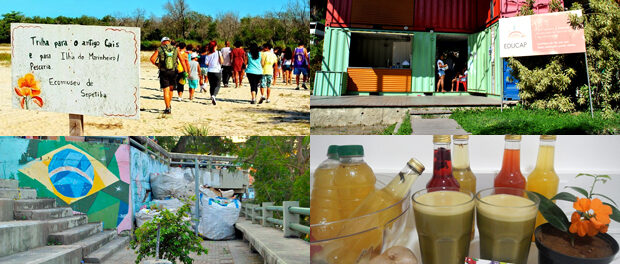
Clique aqui para Português 
In early 2018, Catalytic Communities—the organization that publishes RioOnWatch—launched the Sustainable Favela Network (SFN) map of 111 community initiatives in the Rio de Janeiro Metropolitan Region that strengthen local social resilience and environmental sustainability. The text presented below—on the importance of solutions journalism, by researcher Sophie Pizzimenti of Leiden University—is part of the full “Sustainable Favela Network: Map (2017)” report, which describes the complete mapping process and the results obtained.
In the last decade, a new tendency has appeared in the media: the sharing of solution-oriented news as an answer to the public’s growing desire to read something different than the constant negativity that dominates traditional media. This wave has influenced some mainstream media outlets such as The Guardian, Al Jazeera, the BBC, and others, but is more frequently visible in the rise of new types of magazines, documentaries, and websites that are influenced by a growing body of research and focus explicitly on positive news. Research by Professor Denise Baden of the University of Southampton’s Business School shows how a constant bombardment of negative news discourages and desensitizes audiences, leading them to disengage from the problem being discussed.
In contrast, the implementation of positive news and solutions journalism seems to lead the reader in another direction: toward interest and engagement. This new approach of positive reporting is like a breath of fresh air to readers who—various studies conducted in recent years show—are more likely to respond to and share positive news than negative news. Not only are the response and sharing rates higher, but the readers also show a greater desire to take positive action, as explained by Jessica Prois, editor of Good News and Impact hosted by the Huffington Post.
Furthermore, positive news seems to have a direct impact on a reader’s perception of self-efficacy (that is, the reader of this type of news sees themselves as more capable of confronting challenges, problems, and choices), as Christoph Klimmt explains in his book, The Routledge Handbook of Media Use and Well-Being. In the book, Klimmt cites research that shows the significant link between the type of news shared by individuals and their levels of well-being and engagement. Studies show that a constant “dose” of news that is positive and oriented around action contributes to a sense of capacity to act and confront (daily) challenges with resilience. Similarly, the Solutions Journalism Network shows how journalism based on solutions increases the public’s feelings of efficacy and the likelihood of engagement in the topic being discussed. For the majority of editors, journalists, and readers involved in this wave of journalism, the principal objective is to stimulate a positive response from the public that effects positive change (in society). As Jessica Prois said: “My favorite pieces are the ones in which we guide our readers to take a concrete action.”
Building on this movement, in 2017 we launched RioOnWatch’s new editorial line, focusing on solutions journalism to promote tools for the proactive transformation of our readers and society as a whole. As such, we have been constructing a series of profiles based on the projects in the Sustainable Favela Network aims to enhance the public’s positive perceptions of and engagement with the initiatives described, encouraging readers to take action of their own towards sustainability with inspiration from these projects.
Rio de Janeiro’s favelas are parts of the city that primarily receive coverage in news items about violence, or in the best of cases, government negligence. Yet, as stated by Lidiane Malanquini from Redes de Desenvolvimento da Maré (the Maré Development Network), it is necessary to change this violence-oriented narrative and emphasize the positive actions and initiatives that exist in these communities. By highlighting a wide range of community projects that are making favelas all the more sustainable and resilient, RioOnWatch’s Sustainable Favela Network profile series helps to respond to this demand and need.

